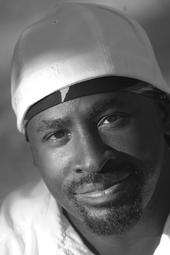YOU CAN ALSO BUY NEVER GIVE IN & OTHER PATO BANTON PRODUCTS ON PATOBANTON.COM
Pato Banton gave up reggae to change his community, but his music is changing the world...
Depending on your point of view, Pato Banton's career either started or ended with a bullet. It was fired in 2000. Banton, a two-decade reggae institution around the world, was on tour at the time. He had spent the better part of the year as a spokesperson for the World of Music, Art and Dance (WOMAD) organization, the Peter Gabriel-inspired cultural group that works around the globe with the underprivileged. He'd done time in Mafia-riddled Sicily. He'd held workshops with various tribes in South Africa. Even met with Aboriginal leaders in Australia. He was doing good work, feeling like he was making the world a better place for people.And then came the bullet -- from several thousand miles away. His son was shot in a drive-by back in Banton's native Birmingham, England. Banton was crushed. "It made me feel like I was working with kids all over the world but I was an alien in my own community," he says. "I wanted to change that. I had to change that."So he did. He may have spent 20 years in the music business, slowly morphing from a local DJ in Birmingham to a side member of the English Beat to a full-blown reggae phenom -- scoring international hits with tracks like the dance-infused "Baby Come Back" or the quirky "Don't Sniff Coke" -- but that didn't mean anything to the kids on the street. Banton had to be right next to them to have an impact, and he knew it. He gave up touring, gave up his music career for a new one. He went back to school, became a kindergarten teacher. He set up music programs at several colleges, built summer vocal camps and started the Music Technology School in Birmingham. He reached out to troubled kids and helped them develop their skills. He let them work in his studio. He set up nonprofits. He became a new kind of phenom. While his records were still scoring hits, and his last studio album, Life is a Miracle, was getting Grammy attention, he was focused on anything but his own music. And that was perfect."We helped a lot of kids," he says with pride in his voice. "Once I decided to take time off and really try to make an impact in my own community, things really took off. I feel very proud of the last six or seven years."But pride doesn't always cure the itch. Banton had felt it for a few years. He wanted to get back on stage -- but not because he was worried about his music career. Banton's never been one to fret over success. His only worry was that he was ready to make a comeback, but the rest of the world didn't care."I thought I was going to have to start from the ground up, build an audience again," he says. "But the first tour I did earlier this year [was] entirely sold out. There was a new generation singing my songs. It was just a mystery to me."To the rest of the world, though, it was pretty simple. While Banton had been away, he'd become a legend. His music was handed down from parents to children. His albums had become standards in the reggae world. His live shows were hailed as astonishing. Even the occasional appearance on the soundtracks of movies like the surfing documentary Step Into Liquid didn't hurt, introducing Banton to entirely new crowds. He'd crossed over, and the only reason he could think of was the same one that got him interested in reggae in the first place."When I was growing up, my stepfather was a DJ in Birmingham," Banton explains. "From the age of eight I was seeing reggae evolve from rock steady to dancehall to roots reggae, and being a first-generation black youth in England dealing with racism and feeling alienated in my own country, reggae really spoke to me. It talked about slavery and Africa and injustice and feeling alienated. It spoke to who I was and how I felt, and it helped me understand what I needed to do to be happy."Now I hear a lot of kids say that their parents used my music as a grounding thing for their children. The music became part of their life, and that's just amazing to me. Because I felt I got so much out of reggae I had to give some back. Now it's having the same impact. There's no way to describe that feeling."
BY JEFF INMAN/LAS VEGAS CITY LIFE 7/13/06
North & South America Management:
Roberto Angotti 360-945-3459
To contact Pato directly message him here on myspace.
